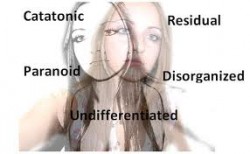Types of Schizophrenia

Learn the different types of schizophrenia.
Schizophrenia is a lifelong disease that requires consistent treatment and care. There are five types of schizophrenia. Each type of schizophrenia has rather distinct symptoms and is characterized by certain patterns of behaviors. The five types of schizophrenia include:
- Paranoid Schizophrenia
- Catatonic Schizophrenia
- Disorganized Schizophrenia
- Residual Schizophrenia
- Undifferentiated Schizophrenia
Paranoid Schizophrenia
This type of schizophrenia is characterized by auditory hallucinations and delusions that do not exist. The individual will hear voices that aren’t there, he or she may think that an organization or other person is “out to get them” and the paranoia that accompanies these delusions can make coping with this type of schizophrenia quite challenging. Most people who suffer from paranoid schizophrenia are angry, anxious, argumentative and tend to reflect on others harassing them or otherwise making their lives difficult.
Catatonic Schizophrenia
People who suffer from catatonic schizophrenia will suffer from motor disturbances which may cause them to stop reacting, speaking or otherwise being active. The signs of this type of schizophrenia can resemble a permanent state of stupor or agitation. Catatonic schizophrenia prevents the individual from being able to properly care for him or herself and usually results in a need for complete hospitalization so that the individual does not pose a risk to themselves or to others.
Disorganized Schizophrenia
This type of schizophrenia is characterized by having behaviors or speech patterns that are highly disorganized and difficult for others to understand. Disorganized schizophrenia can cause outbursts that seem completely off task or out of control such as violent laughing for no reason or making statements that make little or no sense at all, especially under the current circumstances. Disorganized schizophrenia can make daily routines challenging as the individual is interrupted with regular disorganized and irrational behaviors.
Residual Schizophrenia
Residual schizophrenia is characterized by having a past history of psychotic episodes or schizophrenia but currently showing no signs of the disease. For those who suffer from residual schizophrenia, the symptoms have gone dormant but it is recognized that these symptoms could sneak back into the picture at any given time causing major problems in life. Residual schizophrenia is like remission and while it may stay away for many years, there is always a risk for psychotic episodes to return.
Undifferentiated Schizophrenia
This type of schizophrenia is characterized by having various symptoms of schizophrenia but a mixed set of symptoms that makes it difficult to narrow the diagnosis down to a specific type of the condition. Individuals who suffer from undifferentiated schizophrenia may hear voices like a paranoid schizophrenic but he or she may also exhibit disorganized behaviors similar to a disorganized schizophrenic. The undifferentiated schizophrenic will exhibit signs from all of the types of schizophrenia but will not show enough individual characteristics from one set type in order to be diagnosed as having that particular disorder.

